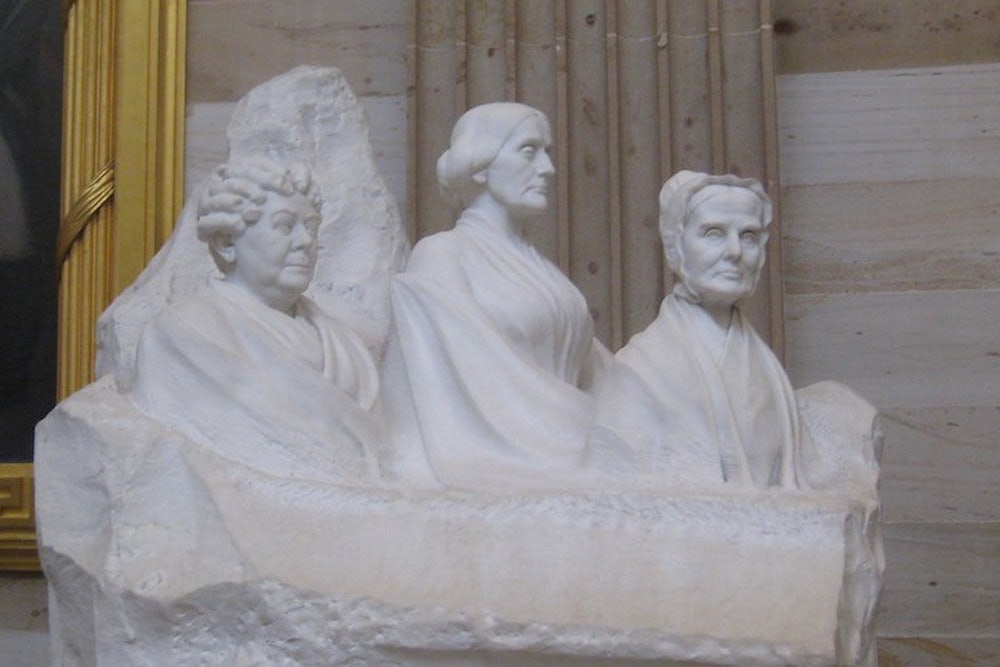Here are two formidable volumes; letters, diary and reminisces of Elizabeth Cady Stanton. For a moment you wonder if there can be anything new or exciting that has not been revealed and revealed again about woman suffrage and its founders. But the most faint-hearted reader is rewarded. Neither ancient history nor propaganda can obscure the irresistible personality tha shines through the seven hundred or more pages of the book. You know, somehow, that if Elizabeth Cady Stanton had never thought of woman's rights, she would have discovered something equally adventurous to whet her appetite for action.
One anecdote, among many, is of a young man who used to put up her stoves for the winter. "He told me one day," she wrote, "that he thought of getting married. 'Well,' I said, 'above all things, get a wife with a spine and sound teeth!' Stove pipe in hand, he turned to me with a look of surprise. 'Do they ever come without spines?'"
They do, alas! But not the pioneers. No lady without a back-bone advocated woman suffrage before 1900 or thereabouts. Nor would it have been possible since then, if Elizabeth Cady Stanton had not been blessed with such a firm, straight, defiant spine. Here was a red-blooded woman, a warrior who believed in human freedom hard enough to fight for it with all her heart and soul for more than half a century.
Her crusading began about 1826, when as a little girl she attempted to cut certain pages from her father's law books, believing that if she destroyed the printed pages the wrongs of his women clients would be righted. It continued past her eighty-sixth birthday, when, a gloriously erect old lady with a crown of snow-white hair, she was vigorously contending for everything from pockets and bicycles for women to the ethics of free thought.
Elizabeth Cady Stanton was not one of your pious, consecrated reformers. Even if she had a tract on some form of oppression in her pocket there was a merry twinkle in her eye. Perhaps that is why her story is such an engaging combination of anti-slavery and dancing, temperance and the pranks of her babies, joyous adventures with friends and encounters with violent opponents, holding of mobs at bay and dosing the neighbors with homeopathic pills. There was something unquenchably vital about her, a large capacity to live life for all that could go into it from playing a game of chess to bucking a legislature.
Through the record runs another straight-backed figure, her inseparable companion, Susan B. Anthony: "Susan" seemed to be perpetually arriving at the Stanton home, carrying that famous hand-bag always bulging with documents. These cronies never met, we are told, without issuing some sort of a pronounciamento. When the numerous Stanton children were safely in bed, the twain sat far into the night, writing pamphlets and exhortations, plans for legislative campaigns, letters and appeals, contesting inch by inch for the priceless possessions of this generation of women; the right to enter college, to study for a profession, to engage in new industries, own their property and share in citizenship. How they worked! And those heroic journeys by train and wagon and on foot into the backwoods to stir up the people. What if they slept sometimes in rude cabins with mice running over them or sat up in a carriage through the dark, weary hours of night, surrounded by squealing, grunting pigs! They bore it as part of the game and even laughed about it, afterward.
One gathers that there were times when Mrs. Stanton had too much spine, even for her fellow-workers. Most of them favored peaceful, non-resistant step by step measures. When they were afraid of the name Revolution for the suffrage paper, she announced that they might call it the Rosebud if they liked; for her part a revolution in the status of women was exactly what she meant. Again, she showed her caliber by insisting, at a time when respectable people would not consider divorce for any cause, that the question of marriage and divorce was basic in the woman movement. In spite of vituperation, odium, denunciation from friends as well as enemies, she worked persistently for a liberal divorce law. She made her colleagues nervous, too, by demanding that the church cease to be "a terrible engine of oppression, especially for women" and that women be admitted to the ministry and to church offices. In later years, when these her "grave mistakes" were labelled "steps in progress" she reflected "The trouble was not in what I said, but I said it too soon, and before the people were ready to hear it."
It is true, unfortunately, that as we get older we incline to avoid propagandists as the plague. But there was something about Elizabeth Cady Stanton, her vigor, gallantry, humor that makes you suspect that were she here today and handed you pamphlets and tracts to distribute, or bade you canvass from house to house or get up a meeting in Cooper Union, you could not resist her. And when you think of Debs and the Lusk bills, the political prisoners and the loss of free speech, you can't help feeling ashamed of being only a jelly-fish when there was once a lady with such a spine.
